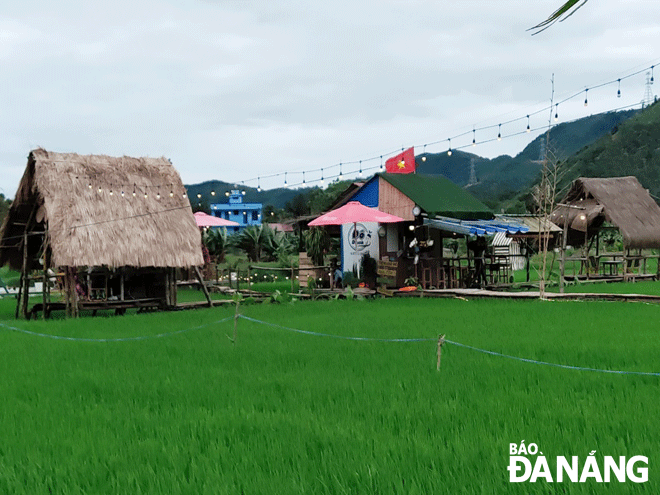Ensuring sustainable tourism exploitation on agricultural and forestry land
Due to growing needs of tourists for eco-tourism, agritourism, and community-based tourism, there has been a boom in spontaneous, small and fragmented tourism services on agricultural land across Da Nang.
 |
| A number of eateries were illegally built on paddy fields in Hoa Bac Commune, Hoa Vang District, in service of tourism. (Photo taken in February 2022 by THU HA) |
Unauthorised construction on agricultural land
Since the first community-based eco-tourism model developed by Mr. Dinh Van Nhu in Gian Bi Village, Hoa Bac Commune, Hoa Vang District, was put into operation in 2018, 11 more households in Hoa Bac Commune have started to build temporary works on agricultural land for sake of developing tourism, food and photography services.
In which, the Yen Retreat in Nam Yen Hamlet, the Phuoc Ha eco-tourism area, the CoCo Village in Loc My Hamlet, the Me Village in Nam Yen Hamlet, and the Cu De House in Nam Yen Hamlet, are offering campsites. Meanwhile, the other sites are providing for food, beverage and tourism services.
Temporarily-built sites on agricultural land are erected with such rudimentary materials as bamboo, cork, wood and iron, which do not change the land use purpose and destroy the land.
The aforementioned business models have created jobs for some local workers who can earn an average income of VND4-5 million/month.
Most of these agricultural lands are inefficiently productive. Combining production activities with tourism services on agricultural land has brought better income to, and created more jobs for, farmers, thereby signifcantly contributing to the development of services in the locality.
In recent years, in Hoa Bac Commune, a number of ecotourism service providers have spontaneously set up stalls and decorated check-in areas on agricultural land to serve the organisation of outdoor experience activities, and accommodation services. Most notably, some areas have been not in accordance with the provisions of law.
Therefore, the Urban Committee of the municipal People's Council proposes the Party Committees, People's Councils People's Committees of Hoa Vang District and Hoa Bac Commune rectify, handle and terminate the improper use of agricultural land, as well as stop illegal construction of works on agricultural and forestry land to establish illegal tourism and service establishments.
Vice Chairman of Hoa Bac Commune People's Committee Truong Thanh Nhan said that the commune authorities have made administrative violation records and imposed fines on illegally-constructed temporary works on agricultural land. People have asked permission from local authorities to temporarily install tents, stalls and wooden houses in order to serve tourism, and have been committed to dismantling these works themselves as per request of the State agencies and also not asking for compensation and support.
How to develop eco-tourism, community-based tourism in a right manner?
Chairman of the Hoa Ninh Commune People's Committee Le Duc Thuong affirmed that there are a number of models of service and eco-tourism in the commune, but all are developed on rural residential land, there are no cases of building services and tourism works on pure agricultural land.
Currently, Hoa Ninh Commune is completing a project on developing community-based tourism in the locality. However, what the authorities and people of the commune need is to clear and suitable mechanisms and policies to promote the development of eco-tourism, community-based tourism, and agritourism.
Head of the Culture and Information Office of Hoa Vang District Do Thanh Tan said that tourism development is a new direction in rural economic development, shifting from agricultural production to an agricultural economy in the direction of multi-sector integration. The development of rural tourism in association with building new-style rural areas in Hoa Vang District will be an inevitable trend in an organic and reciprocal relationship.
Developing agritourism is one of the important solutions and driving force to promote the building of new-style rural areas in a sustainable manner. At the same time, the building of new-style rural areas is the foundation to support and create favourable conditions for the diversified and sustainable development of tourism.
And, Hoa Vang District currently boasts a great potential for the development of rural tourism with an increasing number of tourists to the locality.
Most recently, Hoa Vang District has made a lot of efforts in seeking a development direction for tourism suitable for its current ecological and cultural potential.
The community-based tourism sites in Ta Lang and Gian Bi villages in Hoa Bac Commune, with the operation of the A Lang Nhu homestay, has marked the right approach of the district in developing community-based tourism and spreading inspiration to local people.
Talking to a reporter from the Da Nang Newspaper, Head of the Urban Committee of the City People's Council Nguyen Thanh Tien affirmed "We support eco-tourism and community-based tourism to develop rural areas and improve people's lives. Many localities do very well, especially Mai Chau (Hoa Binh), and Moc Chau (Son La), but they build accommodation and homestay models on rural land, not on pure agricultural land.
“As for Hoa Bac Commune in particular and Hoa Vang District in general, if the authorities want to develop tourism on pure agricultural land, they must develop a project to develop community-based tourism and comply with the provisions of Resolution No. 82/NQ- People's Council on December 17, 2021 City Council” added Mr. Tien.
Reporting by HOANG HIEP, THU HA - Translating by M.DUNG